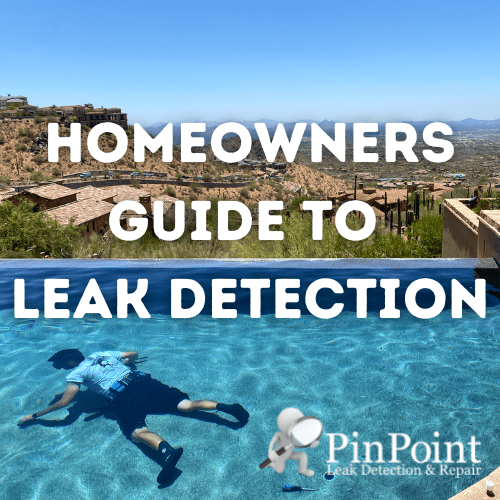
Swimming Pool Leak Detection
If you live in Arizona, theres a good chance your home has a pool or you plan to add one in the future. With the high temps in the summer, having your own backyard oasis to escape to helps you forget about the insane heat. With that oasis, however, comes responsibilty. While most of that responsibility comes from maintaining it and keeping chemicals balaned, its also important to be educated regarding leaks.
Whether you maintain your pool yourself or hire a company, its still important for you as a homeowner to know the signs of a leaking pool and everything that comes with swimming pool leak detection. Luckily, we have all the information you need right here in this homeowners guide to leak detection.
The Cost of a Leaking Pool
Unfortunaly, there is no exact number that we can give you. It all depends on how many leaks there are, how long it has been leaking, the size and features of your pool, and what repairs will be needed. What we can say is that, the sooner you find a leak and get swimming pool leak detection done, the better.
Water Loss From a Pool Leak
Before we go over the numbers, we want to remind you that a tiny amount of water loss is normal. This is due to the natural occurance of evaporation, especially in the hot summer months. Evaporation generally causes your pool to lose about 1/8 inch of water a day – 1/4 inch at the most. Anything over 1/4 inch a day points to a leak.
Not sure how much water your pool is losing? Check out this DIY test to help you measure the exact amount of water loss.
Cost of a Pool Leak
As a pool leak grows, more water is allowed to escape and travel to other areas of your pool, your yard, and even your neighbors yard. Letting a leaking pool go without repair for too long will result in more costly damages than what originally caused the leak.
On top of that, a leaking pool causes water bills to rise significantly. In fact, a huge increase in your water bill is one of the first signs of a pool leak. With the average pool losing anywhere from hundreds to a thousand gallons of water per day and having to replenish it, its clear why it causes such an increase in use.
Common Signs Of a Pool Leak
We can’t stress enough how crucial it is to find a leak sooner rather than later. While you may have a pool company that does your weekly maintenance and inspections, its important for you to also know what signs to look for.
Leaks are hidden from the naked eye the majority of the time and tend to go unnoticed due the the lack of education provided to the homeowner. We want to make sure we provide you with the proper knowledge so you can be as proactive as possible and protect your investment. Getting swimming pool leak detection done in the early stages of a leak can be the difference between having to spend a few hundred dollars rather than a few thousand.
What are the signs of a leak?
wet spots in your yard
This sign is easily overlooked. Wet spots can appear around the pool or in your yard for various reasons. However, if you start to notice constant wet spots in the same area, its likely caused by a leak.
constantly having to add water to pool
If you are frequently needing to add more water to your pool, it is most likely leaking. While evaporation typically accounts for up to 1/4 inch of water loss per day, anything more than that is likely due to a pool leak. If you have an auto-fill, you won’t see the physical drop in water. Check on the auto-fill during your weekly mainenance. If you notice it is running non-stop, you have a pool leak.
Check out the Evaporation Estimator to get a current evaporation rate in your area based on local weather data.
cracks or loose tiles
Over time, the water coming from a pool leak will travel to surrounding areas of your pool. As more and more water makes its way to these areas, the ground surrounding your pool is starting to shift and become unsettled. As this is happening, cracks are going to start forming in your pool and tiles will begin to move. Eventually, this causes even more leaks on top of the original.
higher water bills
Like we just mentioned, auto-fills mask the fact that a leak is present. Since it is keeping your pool full regardless of a leak, the excess water use is sure to translate to a spike in your water bill.
air bubbles coming out of return lines
Air bubbles (or dirt) coming out of the return lines is a sure sign of a leaking pool. These air bubbles are often accompanied by unusual gurgling sounds.
water under pool equipment
Puddles under the pump or pipes in the equipment area is one of the most obvious signs of a leak. Visible corrosion on the various parts of equipment is also a clear sign of a leaking pool.
algae growth or difficulty keeping pool chemicals balanced
As your pool is leaking water, it is also losing the chemicals within that water. This leads to inconsistent levels of important chemicals needed to keep your pool water clear and healthy. Improper levels of chemicals give algae the perfect environment to grow and thrive. If you use a pool company for maintenance, they should be testing the water every week and letting you know if they notice any inconsistencies in chemicals levels that are a cause for concern.
Pool Leak Testing
When it comes to swimming pool leak detection, there are a few different tests that are done.
DIY Leak Test
Before calling a professional, we recommend conducting a simple DIY test to give you a better idea on whether or not your pool is leaking. This test is commonly known as a Bucket Test. You just need to grab a bucket, a brick or large rock, and a sharpie. Just rememeber to never conduct the test when it is raining or the pool is being used. For full instructions, click here.
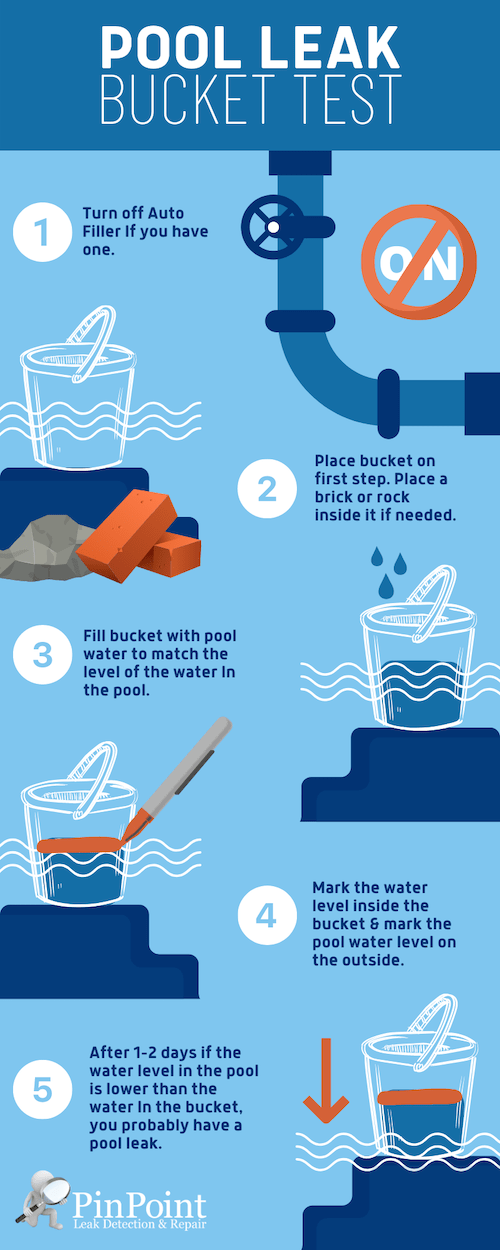
Dye Testing
A dye test is used for testing cracks and crevices in your pool’s surface, skimmers, lights, and fittings. Like the name says, this test requires a syringe of dye. The syringe is then used to push a small amount of dye towards the suspecting areas and if the dye is pulled into that area, there is a leak. If the dye stays and slowly disappears as it mixes with the water, there is no leak there.
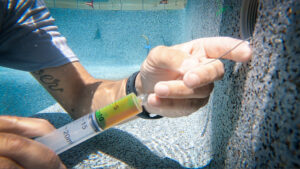
Pressure Testing
Like mentioned before, pool leaks can be hidden to the naked eye due to them being in underground plumbing. Pressure testing is a method that allows us to figure out whether or not any of the suspected plumbing lines have a leak present. To put it simply, we plug off the lines in your pool, induce them with Co2 and monitor the pressure gauge connected to the lines. If pressure is held, there is no leak. If pressure drops, then there is in fact a leak.
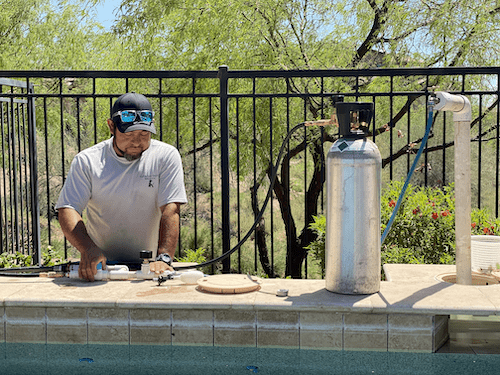
Sonar Technology & Listening Devices
This innovatie swimming pool leak detection method is non-invasive and relies on sound to pinpoint the location of a leak. It starts by inducing the underground lines with air and then taking sonar equipment to listen for leaks. We know there is a leak when a sort of boiling noise is heard where the air meets the leak. This method helps avoid the need to dig up the yard when searching for the location of a pool leak.
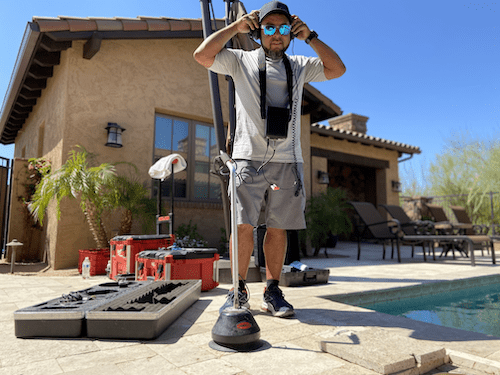
Contact a Professional
Proper swimming pool leak detection is key to finding the exact location of a leak and doing it in a safe and efficient way. We put this guide together to help homeowners get a better understanding of pool leaks and equip them with the necessary knowledge needed to notice a leaking pool sooner rather than later.
However, we always recommend contacting a local professional to conduct the various tests when you suspect your pool is leaking. This is due to the fact that the testing requires specific equipment and training and the repairs can be complicated. Pool leaks aren’t something to mess around with and its crucial they are dealt with properly to ensure no further damage is caused.
